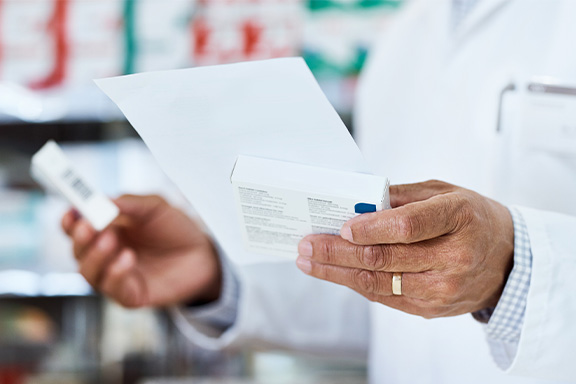Each year, PDL reviews data reported by members, and reflects on the challenges pharmacists have faced, while extracting insights from the patterns/trends that emerged.
Below are the top 10 most reported medicines in the 2024-2025 financial year:
- Oxycodone (immediate and slow release, individually and in combination)
- Semaglutide
- Tapentadol
- Methylphenidate
- Prednisone/olone
- Tirzepatide
- Oestrogen (oral and patches, individually and in combination but excludes oral contraceptives)
- Lisdexamfetamine
- Paracetamol and codeine combinations
- Levothyroxine
The PDL Professional Officers have identified contributing factors for many of these incidents as outlined below.
Schedule 8 medicines
Schedule 8 medicines feature prominently in the top 10 list above. This may be partly due to higher reporting rates when an incident involves an S8 medicine. However, PDL Professional Officers are concerned that the supply of S8 medicines might not be handled with consideration for the extra risks and responsibilities these medicines have for patients and pharmacists.
The wide range and increasing frequency of prescribing S8 medicines, supply problems associated with psychostimulants and trends in prescribing smaller quantities of opioid pain relievers are key contributors to these medicines being frequently reported to PDL.
Other factors include:
- Many variations in strength and form of the medicines
- Large numbers of S8 medicines stored in limited space, leading to selection error
- Fraudulent prescriptions being presented and supplied
- Real-time monitoring system lapses – not checking or considering the information available
- Confrontational or aggressive behaviour from patients
- Challenges in managing overuse or overprescribing
- Prescribers not authorised to prescribe psychostimulants
Glucagon-like peptide-1 (GLP-1) agonists
The frequency of incident reports highlights several challenges posed by semaglutide and tirzepatide prescriptions:
- Confusion with prescribing and dispensing software formats, resulting in the supply of incorrect dose or strength
- Supply shortages, resulting in prioritising limited supplies and managing heightened patient expectations
- Brands of semaglutide that aren’t interchangeable and approved for different indications
- Managing communication and incidents associated with patient or prescriber initiated ‘click method’ of dosing, resulting in incorrect dosage outcomes
Prednisone/olone
There are some recurring themes for prednisone/olone incidents:
- Wrong/unclear directions transcribed in dispensing
- Paediatric dosage conversion errors – prescribed dose in mg is not translated to mL on the labelled item
- Short-term therapy prescribed but continued as regular therapy in DAAs
Medicines for chronic conditions
Dispensing errors are linked to medicines for chronic conditions, particularly statins and thyroid medicines. Common incidents reported include:
- Wrong strength dispensed or supplied
- Mix-ups with active ingredient prescribing
- Incorrect drug selection, especially with combination medicines
- Inadequate scanning procedures
Other notable incidents
While outside the top 10 list, PDL continues to receive reports involving incidents previously flagged as dispensing errors. These include:
- Minoxidil – prescribed as 1mg to be compounded but 10mg proprietary product supplied
- Atropine eye drops – prescribed by ophthalmologists or optometrists as 0.01% or other low strengths for sight correction in children. Typically, atropine 1% is supplied with side effects often experienced
- Pramipexole – dispensing errors involving mix-ups with 0.375mg and 3.75mg
- Wrong patient errors – often closed questions are used and steps to positively confirm the identity of the person collecting the medicine are not implemented
Looking ahead
Understanding common incident trends can help to raise awareness of where risks typically arise in practice. These insights present opportunities for pharmacists to reflect on their own processes, identify areas for improvement and take proactive steps towards safer practice.
PDL members can call 1300 854 838 for advice and incident support from one of our Professional Officers.



